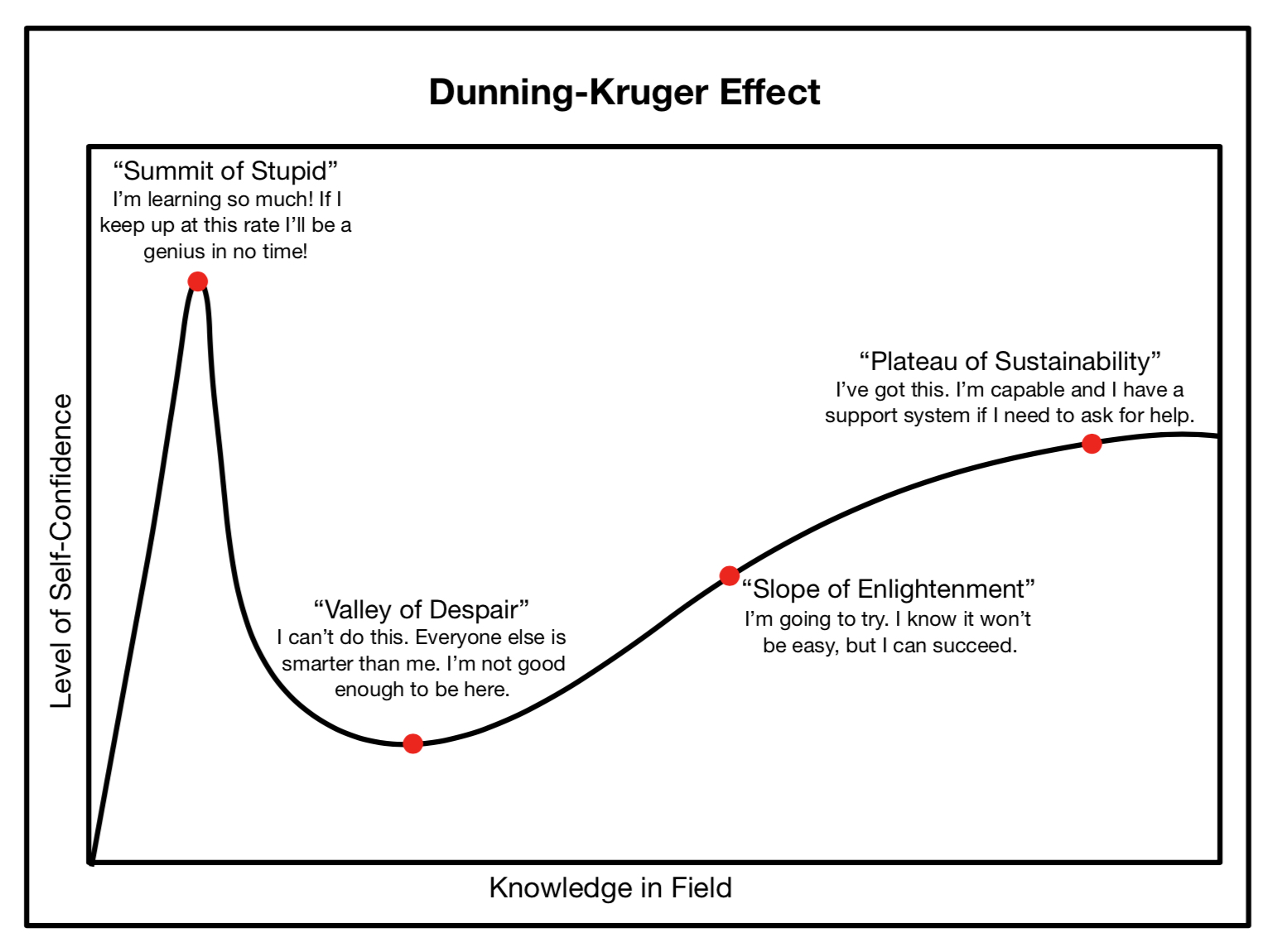+ Harness your inner groove and your outer authenticity with drummer, producer, and artist The Pocket Queen. Check out her course on Soundfly.
Have you ever had a little voice in your head whispering that you don’t know what you’re doing? Ever looked around the room with a sinking feeling that you’re the least qualified person there?
In small doses, these impulses can push us to improve, to get help and learn from those who’ve come before us.
However, when that mentality seeps into our lives and latches on for months, years, or even decades, we find ourselves faced with the far more problematic Imposter Syndrome.
The Dunning-Kruger Effect is the best representation I’ve found to conceptualize the progression that most people follow during their careers. As you can see, it’s not a linear road to travel, even in its most simplified form.
As 2021 continues, and we hopefully start to make our way back to work, many of us are facing the discouraging outlook of a year or more of lost time in our careers. Most of us will have to take a few steps backward before we can go forward in rebuilding our professional confidence.

When I started my career I was excited: I’d wanted to tour since I learned that was an actual job and I was ready to hit the ground running. Instead, the ground hit me. I loved my crew and running shows and seeing the country, but there was a learning curve (like with any new job), and I was suddenly very much aware of just how much I didn’t know.
Imposter Syndrome hit hard at that stage in my life and turned my learning curve into a confidence free-fall from my Summit of Stupid.
For such a sharp plunge on that graph it starts out deceptively small: a little voice in the back of your head harping on every mistake. That voice monopolizes your attention when you realize you’re making someone wait while you finish a project. It whispers, “they’re right” when you’re told, “It’s not something I can teach you if you don’t understand it.” These little things build on each other and grow until you wonder how you were even hired in the first place.
“Imposter Syndrome is a toxic relationship with yourself.”
I spent most of my time as an A2 caught in a loop: I felt horrible at my job so I figured I should quit, but I’d be just as horrible at anything else, so I should just stay where I was, but I felt so horrible at my job…. That cycle went on for years before I found a way out. There were days I was depressed and didn’t know why, but also days I went out with the crew after a tough load in and laughed so hard that I squeaked.
Once I was told that my brand of book-smart intelligence was good for nothing more than being a “party trick.” Other times I had shows I mixed where everything clicked and I fell in love with my job all over again.
Imposter Syndrome is a toxic relationship with yourself. It keeps you guessing at every turn: constantly off balance and convinced that the world is waiting for the right moment to pounce. The thing is, everyone other person around you is dealing with those exact same feelings. So, the good news is you’re not alone.
The even better news is this isn’t permanent. Imposter Syndrome is effective because it puts you on defence and instills a reactive state of mind. You no longer trust yourself to give an accurate assessment of your own skills. Instead, you take your cues from the words and reactions of those around you, and always give extra weight to the negative because it agrees with that little voice in your head.
After all, why should you even try to improve when people who know so much more than you have told you that you’re hopeless?
The best way to quiet that voice is proactivity. In a proactive mindset, you dictate your own self-image first and all other information is evaluated, but not treated as fact purely by default.
One of the best proactive moves I made was transitioning from an A2 to A1. Unknowingly, that was my final major step out of my Valley. Three years up the Slope, I was in tech for Miss Saigon when a colleague told me he was worried that I didn’t realize how hard the show was to mix.
Reactively, my self-esteem would have curled up in the fetal position and that voice would have whispered what an idiot I was to think that I was even halfway decent at my job.
Proactively, I raised an eyebrow at a comment made out of stress-induced worry. After all, I’d spent as much time as I could working on my script, learning the show, and practicing the mix. While there would inevitably be a few mistakes, I had come prepared and I knew I could handle them.
+ Read more on Flypaper: “Resistance Is Futile: On Letting Creative Flow Happen.”
Practicing proactivity gives you a solid foundation to approach a project or learn a new skill. And just like Imposter Syndrome, it starts small. It’s taking the time to relabel a cable instead of having to wrack your brain for its name every single load in. It’s refining the way you explain a project to the local crew so they don’t have to ask you to clarify the directions seven times. It’s signing up for a class or a workshop that the little voice says you don’t know nearly enough to attend.
These seemingly insignificant steps give you the building blocks for the rest of your career. Now, I’m particularly efficient at loading in and out shows because back then, in any proactive moment I had, I made one tiny tweak after another. Sometimes it was looming the end of a cable bundle a different way or even making a whole new loom for a special project. Other times it was pre-marking a tape measure to make instructions less complicated or taking pictures of an efficient case pack so it was easier to duplicate.
Bit by bit the small fixes accumulated to make me more efficient, clearer, and more consistent.
+ Learn production, composition, songwriting, theory, arranging, mixing, and more; whenever you want and wherever you are. Subscribe for full access!
Even after two years on my way out of my Valley, it wasn’t until the tech for Miss Saigon where it actually hit home that I didn’t feel like an Imposter anymore. That month was challenging to say the least, partly because I was faced with many of my former triggers: not having all the answers, people getting frustrated, negative comments, and more.
That voice started whispering again, but when it did, I realized that I hadn’t heard more than a momentary peep from that insidious little thing in all of my previous two years as an A1. Without those triggers, that voice couldn’t sustain itself.
I was not the common denominator.
At that moment, I had the choice to drudge up my old, reactive habits or stick to my new, hard-won, proactive ones. Tech was still tiring and stressful, but I was better able to identify and mitigate my triggers. I did my best to address problems and solve what was in my control or ask for help with what wasn’t. If someone got frustrated I did my best to talk with them to see if there was an underlying issue. There was no way to avoid every frustration, but I could make sure I didn’t add to them unnecessarily.
“In a proactive mindset, you dictate your own self-image first and all other information is evaluated, but not treated as fact purely by default.”
If you find yourself with your own negative little voice, practice being proactive whenever you can. Even if it seems like it’s pointless, do it. One baby step at a time. Also, make a point to keep mementos. Did you have a great day, mix an amazing show, solve a tough problem? Write it down. When someone sends you a note or text or email telling you how amazing you are, save it, screenshot it, flag it. If you have a bad day, pull those out to remind you that this is temporary.
Lastly, find your kindred spirits: people who aren’t afraid to be honest when you need a swift kick, but will always have your back. (It helps if they work in the same industry and understand your world.) Mine are my former A2’s, current dear friends, and the very people I ask to proofread everything I send to this blog.
Rachel, Mark, and Dan were with each with me for a year of my first three tours while I navigated a new chapter in my career as an A1. Touring with someone creates a unique bond in itself, but each of these three have gone well above the call of duty time and time again to offer support, help, and motivation anytime I’ve needed it.
It’s not an easy road out of Imposter Syndrome, but the only way out is through. Keep in mind that you are not alone, grab a friend, and do your best to get a little better, one baby step at a time.
Keep on Grooving…
Continue your learning with hundreds of lessons on songwriting, mixing, recording and production, composing, beat making, and more on Soundfly, with artist-led courses by Kimbra, Com Truise, Jlin, Kiefer, RJD2, and our new The Pocket Queen: Moving at Your Own Tempo.
—
Heather Augustine is an audio engineer currently touring around the US with Broadway-style shows. She graduated from Penn State University with a BFA in Theatrical Design and Technology, with an emphasis on Sound Design, and has been on the road for the past 7 years. During her career, she has worked on a variety of shows including Billy Elliot, Dirty Dancing, Phantom of the Opera, Les Misérables, and Miss Saigon. She is the A1 for the first national tour of Mean Girls.





